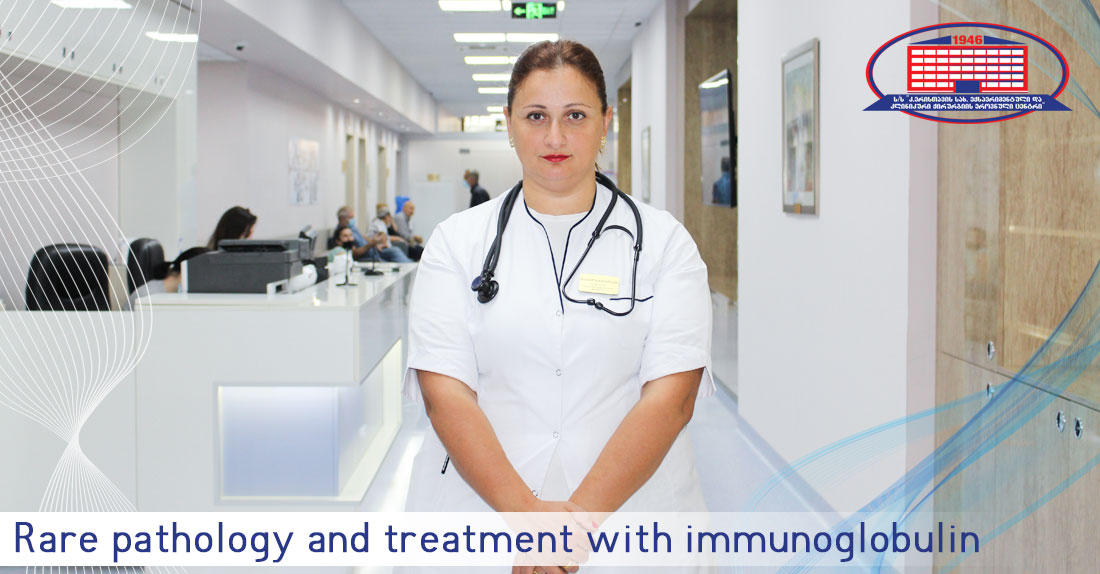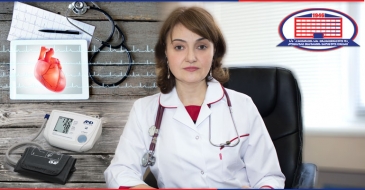
A clinical example of successful treatment of a rare pathology
In the interview you will learn the following information:
- What is immunoglobulin;
- Immunoglobulin function;
- What causes immunoglobulin deficiency;
- Exclusive opportunities for the neurological department of the National Center of Surgery;
- Management of immunoglobulin deficiency.
Immunoglobulin is an antibody produced by the human immune system, and an antibody is a protein that is secreted by plasma cells in response to various antigens. The main function of immunoglobulin is to build long-lasting immunity, it is the only one that reaches the fetus through the placenta, and although passively, but provides its immunity.
We are talking to Tatuli Gubeladze, a neurologist at the National Center of Surgery.
- What is immunoglobulin?
- This is a group of proteins in the blood plasma that is produced in response to the introduction of an antigen into the body. Immunoglobulins are mainly involved in the secondary immune response.
- What is the function of immunoglobulin in the human body?
- Antibodies bind to active sites of bacteria or viruses and prevent them from multiplying or neutralize the toxic substances they secrete. The presence of antibodies in the blood indicates the interaction of the organism with the antigen against the pathogen.
- What can cause immunoglobulin deficiency?
- As already mentioned, Ig antibodies play an important role in the secondary immune response, therefore, a lack of antibodies in the body leads to the progression of several diseases, including those that may end in disastrous consequences.
– What can you tell us about the rare case that happened in our clinic?
– According to the patient's family members, the patient referred to one of the medical institutions of the Republic of Turkey due to the patient’s deteriorating condition after treatment at another clinic. According to electroneuromyography in Turkey, the intensity of the cortical response to the somatosensory potential in both shin (tactile, or sensory receptors of the skin, which have a protective function and provide information to the brain about the irritant, or cause of the pain) was normal and their amplitude was- low.
The patient's condition was acute upon entering the clinic. Patient complained about weakness in both lower limbs and ankles.
Upon admission to the National Center of Surgery, the bilateral motor response in the lower extremity nerve, and especially in the small extremity nerve, could not be confirmed, and total denervation (complete nerve dysfunction) was observed in the distal muscles.
However, prolonged motor potentials were observed in muscles with partial denervation, while widespread denervation potentials were observed in all muscles.
– How was the immunoglobulin deficiency managed?
– There was a lack of strength in the lower extremities, the skeletal reflexes of the knee were reduced. As a result, according to the protocol, the patient started an intravenous infusion of human immunoglobulin (Octagam).
In parallel, creatinine and electrolytes were monitored and corrected.
After 5 days of intensive treatment in our clinic, the general condition of the patient improved, the amplitude of movement and sensitivity increased, which had previously been sharply reduced.
After stabilization within the norm of hemodynamic parameters, with appropriate recommendations, the patient was discharged home without any neurological deficits.
In this particular case, the victory over the disease is based on the correct, timely, and effective use of the achievements of modern medicine by highly qualified professionals following modern standards of medicine and science.
Wish you health!
What are patients interested in
Hydrocephalus
Qauestion:: Hello, I want to know how threatening is hydrocephalus for 19 years old girl and is it enough to treat it with medication and needles
Parkinson’s
Qauestion:: Symptoms and treatment of Parkinson’s
Numbness in upper and lower extremities
Qauestion:: I feel numbness in upper and lower extremities and as a result, I experience onset of chest pain. Also, this condition lasts day and night. I’m interested in causes of it.
FATIGUE SYNDROME
Qauestion:: Hello, I often heave shortness of breath, also headaches (especially when nervous), blurred vision during which I perceive surroundings as if I’m half asleep, feeling fatigued since morning. What do these symptoms mean?
Tinnitus (noise and ringing in the ears)
Qauestion:: Hello, I have noise and ringing in my ears for 3 months. What can be cause of it and how can I treat it. Thank you in advance.
Hemicrania continua
Qauestion:: I’m 74 years old. I’ve suffered from migraine headache since my youth. In menopause, I've experienced many severe difficulties and that’s why it hasn’t alleviated and I’m still suffering from it. I take sleeping pills –donormyl. It helps me to sleep, but I still have a headache in the morning. It alleviates when I take citramon + caffeine. Generally, I need a lot of sleep. I was a very active scientist and lecturer. I still have lectures. How to alleviate headaches?








